#edward nygma character analysis
Text
Borderline Personality Disorder in The Batman (2022)
I wrote this in 2022 for a class so I don't fully agree with everything written as it was a while ago and I was trying to get a grade but it's an interesting character study
In the 2022 film The Batman both Bruce Wayne/The Batman and Edward Nashton/The Riddler display signs of borderline personality disorder. While both men fit the criteria for BPD in their own way, this section will predominantly focus on Edward Nashton. Nashton is a white male who appears to be in his late 20s to early 30s. He is shown to have no close personal connections and has little interaction with the outside world other than posting online videos to his approximately 500 followers, communications with the press following his elaborate murders, and a perceived, and in reality one sided, partnership with The Batman. What is known of Nashton’s political ideology is solely centered around the political corruption in the City of Gotham. He has no faith left in the political system or those who participate in it. Though he is a criminal in his own right, the same as his victims, he completely devalues their lives and sees them as nothing more than scum to be cleansed from Gotham and vessels to deliver his message through. He has dedicated his life to exposing the corruption of the Gotham elite due to how he feels they have failed him. Early in his life Nashton was orphaned, the exact circumstances are unknown, and he describes his time at the orphanage as unbearable, stating that he would often wake up to rats biting at him and that at least one of the infants would die every winter. This kind of trauma early in one’s life undoubtedly has profound effects on development and mental health. It is quite obvious from Nashton’s behavior in the film that BPD is not the only disorder caused by his past trauma; he likely has PTSD and displays a high amount of delusional thinking that may not be attributable to borderline personality disorder.
Nashton is fixated on both Bruce Wayne and The Batman, unaware that they are the same person. He despises Bruce Wayne due to the fact that while he was left suffering in an overcrowded, underfunded orphanage while all of Gotham mourned the loss of Thomas and Martha Wayne and sympathized with Bruce Wayne, alone in his ‘palace,’ as The Riddler calls it. Nashton does not feel that Bruce has suffered as he has and that Bruce must pay for the sins of his father. On the other hand, The Riddler idolizes The Batman for his mission to rid the City of Gotham from crime and corruption. He feels that they are one and the same. When Nashton finally meets The Batman, he is overjoyed that his mission is finally coming to fruition, but when The Batman rejects him, Nashton moves very quickly from panic and denial to total devaluation of The Batman and his abilities. Another,albeit lesser, example of Nashton’s idealization in relationships is his reaction to his fellow prisoner in Arkham Asylum. While Nashton is distressed at The Batman’s rejection, another prisoner begins to offer words of comfort to him. Nashton immediately latches on to this and begins to envision the man as a great friend and supporter without ever seeing him. This clearly illustrates the tendency for those with borderline personality disorder to focus on extremes (idealization or devaluation) in their interpersonal relationships. While Nashton does not display self damaging behavior in the typical sense, it can be argued that his fixation on The Batman, the way he destroys his home to enact his revenge, and his sacrificing himself to the Gotham Police Department (who are notoriously corrupt and not unlikely to desire revenge on Nashton after he murdered the police commissioner) after his plan is completed are all behaviors that are not in his own best interest and at times are damaging to his own wellbeing.
#the batman meta#the batman analysis#the batman 2022#my writing#batman meta#batman analysis#batman#bruce wayne#bruce wayne analysis#the riddler analysis#the riddler 2022#the riddler#edward nygma analysis#edward nygma#edward nashton analysis#edward nashton character analysis#edward nygma character analysis#edward nashton#the riddler character analysis#batman character analysis#bruce wayne character analysis#character analysis#borderline personality disorder#this is from when I was getting my bachelors in social work#im working on my masters now
16 notes
·
View notes
Text
my insane headcannon is connecting all of edward's riddles in how the riddler got his name to his three main foils ( oswald, lucius, lee).
oswald is the indivdual since HE was special, the only one worthly of being the king of gotham AND the only one who understood ed, he is special, he can belong in a group but he is still special.
leslie is loneliness/love riddle since she can relate to Edward when it comes to trusting someone only to have them betray you and kill your new lover, ( the fact both of them started taking drugs kinda after this is also funny)
Lucius is still the reflection, he is still a example of who Edward could’ve become if his childhood wasn’t fucked, if he had people genuinely like him for him and not a persona he put on
the funniest part about this hc is you can argue Oswald is all of these, he gets the loneliness Ed felt and has his whole life ( also the whole fate thing with the woods) and both of them are very, very similar to eachother to the point that deep down they have the same problems. Leslie and Lucius might be able to relate to some of Edward’s problems, but they will never fully KNOW Edward like Oswald did. But also their judgements aren’t as unclouded as Oswald’s are since they don’t have the same problems Ed does, they may not get him as much as Oswald does, but they don’t miss certain things like Oswald does, they know Edward does care for Oswald no matter what he says, which is a major fucking thing Oswald doesn’t know
#edward nygma#gotham#nygmobblepot#gotham fox#gotham 2014#oswald cobblepot#leslie thompkins#lucius fox#character analysis#????? Maybe???? Idk this one feels kinda dull compared to my others man
41 notes
·
View notes
Text
Ed isn’t a cold logician he’s just autistic.
I could leave it there but I have to expand on this if only to be able to explain why I resonate with him.
We’ve seen him referred to as cold or unfeeling since like the start, in the first few seasons it’s not even overtly it’s just implied that that’s how people view him. But he isn’t. He’s incredibly emotional in actuality, to a point where I could put him as a second place for Gotham’s most emotional character.
He only gets called cold because people don’t see how logical and factual his feels are to him, like the pier scene in season 4 or 5 where Oswald tells him that if he listened to his heart more than his head he’d understand, but in season 5 he even admits that he rarely ever harmed a person who didn’t wrong him in someway! When you stop the look at all his major moments in the show it’s all very clearly emotional. Season 3 possibly shows this the best after Ed finds out Oswald killed Isabella, with his violent fantasy where he stabs Oswald. Or when despite everything in season 5 he stays. Practically every major event per season for him is emotionally driven.
He’s seen as always taking into account every fact and detail he can and one of his most driving facts that isn’t mention is his why. His emotions are, to him, factual and are taken into account. Even if he can’t fully understand them, like in season 4 as we see with Lee, or denies them, like how he cares for Oswald, he analyzes them and uses them like he would any other factual thing. And the only reason others don’t see this is the fact that he expresses his emotions in a different way than other people and when he enacts plans that are based on his emotions he’s already gone through feeling them viscerally enough to cause anything that would show it so he basically seems emotionless during it.
And when we put his kind of emotional and juxtapose it against say Oswald’s kind of emotional, most would immediately point out how in this comparison Ed looks emotionless and cold but when you take a closer look it more shows that they’re sides of the same coin. They are cunning, dangerous, and motivated by their heart but act with their heads. For Oswald his heart is stronger than his head and it’s the opposite for Ed but they are both emotionally driven.
TLDR- Ed is very personally emotionally intelligent and a emotional person but people see him as cold because he’s autistic.

#gotham#gotham fox#edward nygma#ed nygma#cory michael smith#nygmobblepot#character analysis#autism#austistic character#the riddler#Cory Micheal smith riddler#robin lord taylor#Robin lord Taylor penguin#the penguin#oswald copplepot#Dappy little ramblings#this was just me projecting for like three paragraphs#emotional intelligence
126 notes
·
View notes
Text
The way that during the knife hug Oswald didn't even hold his knife in a stabbing position
#gotham#tv#dc#lgbtq+#nygmobblepot#riddlebird#ed nygma#the riddler#oswald cobblepot#the penguin#oswald x edward#ships#media commentary#media analysis#show analysis#show commentary#scene analysis#character appreciation#gotham fox#gotham 2014#gotham season 5#5x11#season 5 episode 11
77 notes
·
View notes
Text
I like how Ed and Oswald had equally few friends. They both had
A work friend (Ed - Lee, Oswald - Butch)
Jim Gordon (who did not like them)
#gotham#tv#character analysis#character appreciation#ed nygma#the riddler#oswald cobblepot#the penguin#ship dynamics#otp#oswald x edward#nygmobblepot#riddlebird#ships#jim gordon#butch gilzean#lee thompkins#lgbt+#be gay do crimes#gcpd#alphabet mafia#dc#queer headcanons#canon queer characters#kindred spirits
315 notes
·
View notes
Text
edward nygma (gotham) and OSDD-1a
hi! welcome to my hellhole!! i’ve been thinking about the topic of this post for a while and i just needed to yell about it here bc yelling about it on twitter under a meme post wasn’t enough for me xD
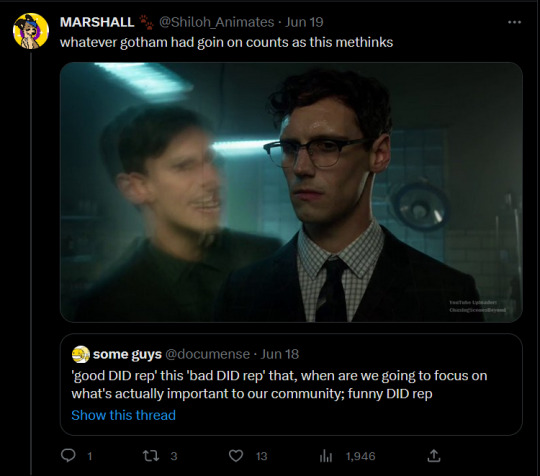
SO! let’s talk about this. i was highly generalizing in the tweet above because i personally don’t think edward nygma suffers from dissociative identity disorder. instead, i believe he suffers from other specified dissociative disorder, specifically subtype 1a.
below the “keep reading”, i will discuss a general overview of DID and OSDD, why i think this is the case for edward nygma, and a review of the representation of it in gotham. be warned that this post has a general trigger warning for discussions of abuse, self-harm, suicide, and drug abuse. this discussion is not in depth at all, but just as a warning if you wanna avoid this post! this post also has a trigger warning for discussions of negative portrayals of DID/OSDD (such as in films like m. night shyamalan’s split and discussions of tropes such as “evil alters”).
OSDD-1 is a subtype of OSDD that is very similar to DID. to get a general gist of what OSDD is, we first have to define DID. DID (dissociative identity disorder), which used to be referred to as MPD (multiple personality disorder), is a dissociative disorder that forms in early childhood as a reaction to prolonged and/or severe trauma (abuse, for example). this causes a child’s brain to split into multiple parts, called alters, and experience amnesia/dissociation between these parts. in OSDD-1 (other specified dissociative disorder), there’s two subtypes, 1a and 1b. in 1a, there’s dissociation between parts, but their parts aren’t as distinct as someone who has DID. on the other end of the spectrum, in 1b, alters are highly distinct but experience little to no amnesia between them. as stated previously, i believe gotham’s portrayal of edward nygma/the riddler has OSDD-1a.
to avoid confusion, in this post, i’ll be referring to the two as a whole as “edward nygma”, “edward”, or “nygma”; i’ll refer to the alter we’re first introduced to as “ed”; and the alter we’re introduced to next as “the riddler” or “riddler”.
while we don’t know anything about edward’s childhood in gotham, many other portrayals of the character (arkhamverse, general comic lore, etc.) mention an abusive past, specifically at the hands of his father. in general comic lore, this abuse explains where his compulsions for showing his intelligence comes from. if this backstory is true for gotham’s portrayal of nygma, which we will assume for this analysis, this is the trauma element of OSDD.
our first introduction to the idea of edward having a dissociative disorder is in season 2 episode 1. while this is our first introduction to the difference between ed and the riddler, the two seem to have a history of co-existing before this scene (ed tells riddler stuff such as: “i get nervous when you talk to me with other people around like that” and “i know where this is going. i told you, leave ms. kringle alone”).
now that we have those basics down (trauma and evidence of a long-standing dissociative disorder), i’ll be referring to an article written by DID-Research.org titled “DID Versus OSDD-1″. this will hopefully help my thoughts be more concise, since i tend to.. go all over the place with this stuff. i tried to write my thoughts on this topic in a discord server before and it went in 50 different directions x3
DID-Research’s article discusses how the parts in OSDD-1a are different from disorders such as borderline personality disorder, posttraumatic stress disorder, and complex posttraumatic stress disorder. while OSDD-1a’s parts are way less differentiated as ones in DID or OSDD-1b, since individuals “are more likely to present as the same individual”, these parts can have “different skills, emotional reactivity, or ways of interacting with the world”. to me, this sounds exactly like what riddler and ed go through throughout gotham. as early as season 2, riddler is shown as more confident, brash, and witty than his counterpart. ed is more focused on living a normal life, he wants to live out this fantasy with kristen, then isabella, then lee. this is all he craves, to be seen as normal and not a freak. riddler on the other hand, isn’t as concerned. sure, he originally wants to pursue kristen, but in a way to introduce a sense of excitement and power in him and ed’s life.
this mention of ed’s craving for a normal life is something.. very interesting as well. according to the theory of structural dissociation, there’s two types of parts a person with OSDD/DID could have. these are referred to as Apparently Normal Parts (ANPs, these alters take care of daily life, often are avoidant (or unaware) of trauma, and have a need to appear high-functioning (sound like anyone we know?)) and Emotional Parts (EPs, these alters represent dissociation and trauma through memories, internalized beliefs, and learned responses). ed seems much like an ANP, while riddler seems more like an EP. an article discussing the differences of ANPs and EPs states that an ANP “might engage in self harm or use psychogenic substances in attempts to forcefully tether themselves to the present and prevent EP from intruding”. this sounds very familiar, does it not? his abuse of hallucinogens in season 3 to see oswald again, using pills again in season 4 to try and get rid of the riddler, and if i remember correctly, plotting to kill himself in season 4 as well.
as i stated, the article talks about how OSDD-1a is different from an identity disturbance in disorders such as BPD, PTSD, and C-PTSD. the article specifically says that people with these disorders might feel a loss of control, but never “feel that different parts of them are capable of acting independently or that different parts of them have and express their own views or goals”. this exact quote proves that what nygma might be experiencing is OSDD-1a. our introduction to the two psyches of edward nygma show their differing goals and views. as another example, in season 5, riddler is completely unaware of ed’s plan to destroy haven and is shown as extremely distraught when he appears in different places without knowledge of what happened beforehand.
so.. it seems obvious that edward nygma has OSDD-1a, right? so... how would i, as a psychology major, someone who possibly has DID/OSDD, and someone who’s known multiple people with DID/OSDD, review this representation?
i’d say... it’s pretty good for what it’s worth!! gotham as a tv show has always dealt with terrible writing and a lot of things could have been written better, but this topic is surprisingly one they handled pretty okay. there was... a lot of room for more and it’s quite strange to see the dissociative disorder representation go to edward nygma instead of a character such as harvey dent (who’s a whole other can of worms and has been stated to have “MPD” in the past).
it’s really refreshing to see representation of DID/OSDD that doesn’t rely on played out and disgusting tropes such as “evil alters”. while it seems like riddler might play out as an evil alter, both ed and riddler are both messed up in their own ways. there’s no evil alter to stop, they’re both.. villains in their own ways (blowing up a place w/ the most vulnerable members of the city vs hiding your dead gf’s body parts over a police precinct, pick your poison). i also enjoy how cory michael smith portrays the two psyches of edward nygma and portrays the way the two switch in and out!
you’re free to disagree with my opinion as well. i’d love to have a discussion in the comments or reblogs :DD!! i just... really enjoyed writing this up. if i missed anything, just tell me :33
#gotham#got ham posting#edward nygma#the riddler#gotham 2014#gotham fox#gotham analysis#tv analysis#osdd-1a#psychology#character analysis#psych analysis#other specified dissociative disorder#disociative identity disorder#tw suicide mention#tw abuse mention#tw self harm mention#tw drug abuse mention
49 notes
·
View notes
Text
Miss Kringle's fate: A Useless Essay on the Masks of Abuse and Respecting Equilibriums
(Spoiler for Gotham s2)
I am watching season 2 of Gotham and I finally came to the death of Miss Kringle. I'll have to make a premise: I knew she was going to die already (I spoiled myself quite a lot of the show) and Edward was going to kill her. I had thought, knowing nothing more than these two pieces of information, I would hated Edward for this death. I thought he was going to make a 180 degrees turn, become all of a sudden a horrible man who kills the woman who maybe wanted to break up with him, the epitomy of the violent misogynist. I was wrong, and I am pleased about it. I still think Edward is misogynist, just not in the way I think he would have been, in a way I find more sophisticated.
First of all, to analyse Miss Kringle's death, we have to understand why she was killed. I am usually hesitant to automatically define the killing of every woman as a feminicide, I prefer to use that term only when the motive behind the killing of a woman is directly connected to her gender. What I mean is, if there's a bank robbery and they kill a woman because she was the banker and the thugs needed her dead to steal the money, I personally prefer to simply use the word homicide. If a woman is killed by her partner because she wanted to leave them, especially if that partner is a man, I call that feminicide. That's probably just me, but I say that because I thought, before watching the scene, Edward was going to kill Miss Kringle just because she wanted to leave him. It has to be acknowledged he had another reason for his actions, maybe even more important than the fail of their relationship, which is that she was threatening to tell the police he had killed Tom Dougherty. Ed's reaction does not only depend on his broken heart, but on a very practical reason: he doesn't want to go to jail. As much as he seems to only ask for Kristen not to insult him, there are other reasonings in action behind he keeping her mouth shut and stopping her from leaving the apartment. He doesn't just kill her because "woman weak, man strong, man needs to teach woman lesson". He isn't showing he is the strongest in the relationship, he is trying to protect himself. Does that mean he is not guilt of misogyny? Hell no. But I love how the show treats that.
You see, I was worried Edward was going to turn into Dougherty n. 2, especially with the Riddler saying things like Miss Kringle owed them her love and that women likes their guys a little violent. You have become the very thing you swore to destroy, blah blah blah. But that's not wbat the show does, it's not the Riddler to kill Miss Kringle, it's Edward, and he does it staying true to himself.
Let's get a clear vision of the situation: Edward fucked up by telling Miss Kringle he killed Officer Dougherty. It may surprise you what I am going tp tell you, but I understand Edward. First of all, he was genuinely trying to reassure Miss Kringle. The poor girl was worried she was going to get killed for having another boyfriend, Edward was trying to bring her out of her paranoia. Second: there are moments you feel so connected and so in love with someone, you think you could tell them anything. Spoiler: you can't. Most of the time, you fuck up by being too blunt or revealing them something bad about you, this very romantic idea that your person will love forever and ever the entirety of you is not very realistic. I blame lots of romance books, movies and shows for planting this idea into our head, and especially movies for making us believe that real life is just like a film, that there are scenes too romantic and perfect to be spoiled by a single wrong comment. Usually, when you fuck up a moment like that in real life, you are not confessing a murder to your loved one. Edward was, bad luck. I mentioned romance books and movies and tv shows because I genuinely believe Edward mainly relies, on the subject of romance, on those rather than real life experience. I think Edward thought for a moment he was in a movie and he was the hero, now that he got the girl the story simply ended with a "and they lived happily ever after", nothing could ever change that.
Now Miss Kringle's reaction is completely understandable, she gets scared and she starts insulting Edward. Was that the best strategy to go out of that situation? No, of course not, but can you blame her? She just found out her boyfriend is murderer, and quite proud of it.
Anyway, that's when the fun starts. As I said before, Edward DOES NOT switch to the Riddler, he stays himself the entire time. We have to analyse his words and his actions separately.
Let's start with his words. He is pleading. He is embarrassed, he is ashamed, he is clearly losing the verbal debate. Miss Kringle is the aggressive one, Edward is helpless, almost at loss for words, he just prays not to be insulted. He tries to keep repeating his reasons behind his action, but that just makes things worse (Kristen calls him a stalker). This guy is fragile. His ego was already shattered and Kristen is basically beating a dead horse. Miss Kringle is winning, Edward is losing, badly. He is the scared, he is making up excuses, she is insulting him and threatening him. He keeps showing devotion and love to her hoping this will calme her down. He doesn't suddenly turn Tom Dougherty, he doesn't go "You stupid bitch, I saved you, you owe me!", consciously he is aware he is wrong. His words are the part of himself he can control, and with that part he begs for forgiveness and pity. If we were to only hear their dialogue, I'd imagine she is throwing stuff at him while he is curled in fetal position on the floor. Even her more cutting insults don't make him consciously retaliate against her, threating her to kill her like he did with her ex boyfriend, Edward is acting like the weak one.
Now switch it up, and let's analyse their actions: Miss Kringle is running away, logically, Edward is chasing her. I think their movements represent what they're truly feeling in the moment. They have control over their words but their movements reveal their intentions: Miss Kringle may appear aggressive with the insults, but she is scared and she knows she is the one in danger, she wants to get out of the apartment. Obviously Edward is chasing her to regain, at least physically, some closeness, but then, when she tries to run away completely from the apartment he doesn't simply follow her in the stairs or even the streets, he keeps her in the apartment with physical strength. He is asking for forgiveness on the outside, on the inside he knows he also needs to worry about not ending up in prison, and that's what will happen if he let Kristen go. She hits him multiple times, he is hurt, physically and emotionally, but he has a frenzy in his movements, he doesn't take the time to check his wounds, bring a hand to his face, he is immediately on her. Because he knows he is in danger. Because he knows that Kristen's forgiveness is very important, but that he does not end up in jail is even more important, it doesn't matter if he deserves it or not. He doesn't threaten her with words, he is not ready to acknowledge that, but his actions speak clear.
The scene when Edward holds Miss Kringle tp the door saying he would never hurt her, that he is a good man, while he is choking her and putting a hand on her mouth shows greatly this dissonance between words and actions, in his conscious side and unconscious side. Even then, he is not threatening her consciously. He truly believes himself a hero, he is not lying when he says he doesn't want to hurt her.
And that is the reason I like so much how Gotham treats abuse in relationships.
Edward doesn't need to become Dougherty in order to become an abuser. There's a not a magical revelation in which oh, look at that, Edward is actually exactly like Tom, and he starts acting like him and that's who he truly was all along. Edward and Tom are different people, not all abuse look the same and not all abusers act the same, because abuse has different faces, both Tom's and Edward's.
And it's especially great that we see Edward's abuse because it goes to show that just because someone doesn't believe himself an abuser it doesn't mean he is not one. Edward stood up against Tom's abuse but he couldn't see his own. Edward genuinely thought he was acting good in Miss Kringle's regards and him holding her down towards the door, well, it was just a minor thing to keep himself out of jail, it's not like he wanted to hurt her.
Abusers aren't always villains with an evil plan to lure you in a relationship just to hurt you, they may not even realise they're doing wrong (which certainly does NOT excuse them) and I love Gotham for showing this. In the same way Edward did not realise hebwas hurting, to the point of killing, Miss Kringle, even Tom Dougherty didn't think he was abusing her, he just thought "that's how you treat women". Edward may become a supervillain later on the show, but at this point he is just man convinced he is doing no harm to this woman. Because he doesn't want to harm her he is convinced he is not harming her. Because the reason he is choking her and shutting her up is simply because he doesn't want to go to jail and not purposefully hurting her he is convinced he is not harming her. By my definition of a feminicide I gave before, Edward would say it's not what happened, he didn't want to kill her, he didn't want to hurt, he loved her so he can't be guilty of feminicide, but he is. He just doesn't realise it.
Edward is not Tom, he doesn't think he is the strong man who can take down a fragile woman, his ego doesn't get a boost how that he's proved himself to be stronger than a fragile girl, he knows murder is wrong. He never shows to think less of a woman because she is a woman, he is the first to notice and denounce an abuse, he is lean and lanky, he doesn't look like a gorilla who would attack you, more like a shaking leaf you could easily push around. Still, monsters come in more shapes than one.
I want to be extra fair in this analysis so I'll add even something more about Edward's actions. I have seen a few video essays on Gotham and what they all say is that the city is the true main character, the city shapes his characters and leads them into impossible situations that force them to change and act in ways they would have never dreamed of. I think this becomes incredibly evident in Edward's actions towards Tom Dougherty and Miss Kringle.
I'll start by saying this: I justify Edward's murder of Tom Dougherty. And not because Tom is an abuser (although this obviously makes me sympathise with Edward more than with Tom), but because it was the only way out. Listen to me.
Gotham (the show) spends so much time telling us police is corrupted to the bone and cops often cover eachothers' backs, even when the backs they're covering are guilty of serious crimes. This means that denouncing the abuse Miss Kringle was receiving from Dougherty was not only probably useless, but even dangerous. At best, it would have brought to nothing, Dougherty's colleagues would have said Miss Kringle or Edward were lying (and, especially with Edward, they would have tried to say that he was the creep that was making shit up because of his jealousy); at worst, not only that, but Edward would have got retaliation (probably physical, they would have seriously beaten him up) and the abuse on Miss Kringle would have worsened, as a way to intimidate her from ever trying to come forward again.
If you're thinking of some plot of "making Officer Dougherty leave Miss Kringle/falling for someone else", this does NOT solve the situation, it just means a different woman from Miss Kringle would have ended up abused.
The only solution is, sadly, to do justice by oneself, and that involves violence. Now, Edward use the most extreme option, murder, but let's be honest: it's not like he could ever beat Tom up. And even if he could, Tom would have beaten the shit out of him 10 times worse with the help of his friends. It solves nothing. As sad as it is, unless Edward decided to go to Jim Gordon, The Most Honest Man In Gotham, hoping he could something and quickly, murder is the most obvious solution. Edward could not risk Gordon's involvement to make things worse (and also there's this thing that maybe you don't want to advertise that someone is being abused, the abused person has the right not to want the word to spread and Jim isn't exactly subtle). Anyway, Jim Gordon's involvement was not a guarantee of solving the situation, and again, you fail the first time, Dougherty and his pals become more aggressive and dangerous.
Murder is, technically, always a solution for things, I have to add. You don't want to take a test in school because you know you'll fail? You could technically kill your teacher. Emphasis of technically. That would make you not do the test. Of course you don't murder your teacher for a test, it's an absurd and far fetched solution, a test isn't worth a human life and there hundreds of solutions in between murder and accepting to fail the test (copying the test, not showing up, etc.).
The thing with Gotham (the city) is that it's so filthy and corrupted that even something like murder, which is the last solution you should ever turn to, suddenly becomes a very valid option to consider, especially with a situation as serious as abuse. I don't think Edward was crazy to kill Dougherty, I think he was logical. I think he understood way better than Miss Kringle how things work in Gotham.
Again, Edward is a very logical person. He kills Dougherty because it's the only way to get efficiently rid of the problem, he holds Kristen down and doesn't let her leave the apartment because otherwise she would have got him in jail, he holds his hand over her mouth because her screams would have alarmed the other residents of his building. I am sure part of him also subconsciously knew that choking her and simultaneously blocking her respiratory tracts was going to kill her, but it was the same subconscious part that decided Edward being free was more important than Kristen being alive.
Truly, if we take into consideration how Gotham (the city) works, how it's based on an equilibrium of giving and taking, we may as well put the blame of Kristen's death on Kristen herself. When Edward confesses what he had to do to free her for her abuser and he explains his reasons, he has more of a point than he himself realises. He made a sacrifice to the city of Gotham, he took a life, Tom's, to save another one, Kristen's. Kristen is horrified by Edward's actions, which translates directly in being horrified by Gotham's logic.
She tries to do the right thing. The right thing is not compromising, is telling Edward he is a monster and she'll send him to jail. But she dies, because Gotham doesn't work like that, you don't win doing the right thing. She would have got more chances to win if she pretended to think Edward her hero, to think his actions brave, for the moment, and the day after, at work, she would have confessed everything to the police (people hate Edward Nygma, they would have believed her). She could have asked Edward to give her Dougherty's badge as a proof of his love and later present it to the police as proof of the murder. But that, you see, would have involved foul play, that is the way of Gotham Kristen simply abhors. So she uncover all of her cards and she starts screaming insults and she dies for that, because she refused to bend to the rules of the city.
Edward, instead, understands them very well. When he had to choose between Miss Kringle and his moral principles, he chose Miss Kringle. When he had to choose between Miss Kringle and himself, he understood he couldn't have both, and ultimately, even subconsciously, he killed Miss Kringle. He chose himself.
It's not an easy choice, those are true tears he cries over her dead body, but nonetheless he understood he had to choose. And he did, and that's why Gotham granted him to survive another day. The city is alive and controls all of his inhbitants, the ones who thrive are the ones who understands this do ut des, this constant give and take not even Jim Gordon, the epitome of the honest man, can escape, and that's why he bends to asking and doing favours for the Penguin.
Miss Kringle was asked to choose, live a life happily ever after with Edward and a dark secret or denounce Edward when she could, the only two rational options. She chose the third, to get out of the game, to scream and throw the chess board in the air. Refusing to play the game simply means to die in Gotham, and that was the fate she sealed for herself.
The only one who truly always wins is Gotham itself.
I know this is like a lot for somebody who has just started season 2 and it's definitely overthinking and if you're read until this point wow I'm impressed but Gotham burdens me with thoughts
#gotham#gotham fox#long post#essay#kristen kringle#miss kringle#edward nygma#the riddler#character analysis#tom dougherty
24 notes
·
View notes
Text
It will never not amuse and irritate me that DC gave Eddie an official OCD diagnosis instead of autism…
#HOHOHOHOHOHOOOO#THE MENTAL ABLEISM IN BATMAN MAKES ME GO CRAZY#Trying not to think of everyone else’s misdiagnosis…#edward nygma#character analysis
3 notes
·
View notes
Text
Gender/orientation headcanons about Gotham 2014 Edward Nygma and Oswald Cobblepot under the cut. More rambling character analysis than anything but hey enjoy.
(Feel free to fight me in the comments/reblogs. I love discussing this stuff and would like to hear other's interpretations as well.)
So getting right into it, Oswald I really love as a trans man, but also as a cis man who was denied acceptance as male much the same way Brienne of tarth is a cis woman denied acceptance as female. Either feels like a very feasible read.
Because of his inability to conform to masculine norms and ideals, he has had to claw his own identity as a man out for himself with very few role models and little support.
It's obvious his presentation, when he's able to control it, is very important to him, and the expensive and tailored suits, his styled hair etc, are very vital to his sense of identity which, while not manly in the mainstream sense, represent a masculine ideal to him and are empowering to his sense of self.
For that reason I think of him as very binary.
Even when he dresses more typically "feminine", it's in the context of being a man and forging his own self determined male identity.
Edward is another beast entirely to me though. Unlike Oswald who is shown to have equal contempt/respect for the people around him, male or female, and treats men and women mostly the same, for better or worse: Edward is distinctly shown to treat men and women differently, but as he is foremost a narcissist, they represent different reflections of himself.
He sees women as trophies and affirmations of his success and power as a man, and other men as threats or challenges to that identity. His notions of gender are antiquated, and while he does follow Lee briefly, he does not really afford women the sort of respect of agency he shows to men. Masculinity to him is about conformity, and then later about power.
He tries to impress the men he is interested in by challenging them, testing their limits and proving his superiority over them intellectually. With the women he is interested in, he attempts to conform himself to their needs and become the perfect partner for each of them in order to earn their validation.
He only does both behaviors for Lee and Oswald, which is part of the threat they pose to him, they challenge the boundries of acceptable behavior he's allowed himself, and the reason he tries to kill both is (yes, his ego, but also) because they refuse to conform to the boxes he assigns to men and women, or buy into the ideal of himself he attempts to project, and instead they both demand vulnerability and self-awareness from him, and also they demand he sees them as themselves, as individuals and not reflections. Which is, of course, terrifying to him.
Anyway to Sum-up: Oswald is a binary (either trans or cis) man, demi-sexual and pan-romantic. He isn't really focused on sex at all and can't be straightforwardly seduced, but is very vulnerable to intimately platonic and romantic manipulation, less so as the show goes on but he still basically does everything he does for love, love of his favorite individuals, of groups, of the city itself. He'll say it's about respect and power but everything comes down to wanting love and acceptance.
Edward in the other hand is a bi enby so deep in the fucking closet he needs to be pried out like an impacted tooth. His sexuality is anybody interesting and smart who can affirm/reflect something about himself, and his gender is a riddle wrapped in a puzzle inside a massive attention whore. He is a Chris Fleming-coded theater nerd and his gender is showpig, he just wants a big blue ribbon at the county fair. He is literally only a man because he thinks he can win at it, and that's that on that.
#Edward nygma#Gotham meta#oswald cobblepot#Meta#gotham 2014#Gender stuff#Riddler meta#Penguin meta#Idk how to tag
18 notes
·
View notes
Text
STATISTICAL CHARACTER ANALYSIS: take the linked quiz from the perspective of your character of your character, then select 5-10 results from the ‘complete matches’ list that you feel resonate with your character the most.
1. will graham, hannibal.
2. lucius fox, gotham.
3. edward nygma, gotham.
4. rupert giles, buffy the vampire slayer.
5. egon spengler, ghostbusters.
6. dexter morgan, dexter.
7. el professor, money heist.
8. viktor, arcane.
TAGGED BY: stolen from @mad-huntsTAGGING: @mcnomaniametus, @babydxhl and anyone who wants to do this.
3 notes
·
View notes
Text
Gotham Analysis/Things I Noticed & Theories Masterlist
Repressed Queerness and Queerphobia in Gotham: An Essay (that I'm pretty proud of🤭)
Funny Theory Why Some Nygmobblepot Scenes Were Never Mentioned Again
Nathaniel Barnes Appreciation Post
Jim Gordon's Presentation as a Tragic Hero🤨 (Jim Gordon Slander)
Season 3 Nygmobblepot Theory: Edward Nygma Using Sublimation to Repress his Feelings for Oswald
The Gotham Character Most Likely to Figure Out About Ed's Sultry Hallucination of Oswald (the Answer Might Surprise You 😉)
Canon Physical Nygmobblepot Intimacy in the Mayor Era & Related Headcanons👔
Worst Hairstyle & How It Hints at Gobblepot
Edward Nygma's Opinion on Pizza Hawaii and Why There's a Pineapple in His Appartment (How I Met Your Mother Style) 🍍
My Question About Oswald's Bad Deed in Season 1 Episode 17
The Unintentional Humour in Season 1 Episode 16 (Charles Van Dahl)
The Sadness in Season 1 Episode 16 (Oswald Cobblepot)
Who Did Jim Gordon Vote For?
Why Oswald Cobblepot Keeps Surviving Being Thrown into Water (Funny Theory)
What Happens When You Look Up IsabellA on the internet (ridiculous conspiracy theory)
Gotham Conservapedia Ridiculousness (Analysis of Homophobic Warnings 🤨) 🏳️🌈😂
Edward Nygma went from...to...💀
Different Perceptions of Oswald Cobblepot's Gorgeous Looks
Google's View of Nygmobblepot
More Os at What Cost
Gotham Ship Constellations🌃
Nygmobblepot (& Gobblepot) Girlfriend Parallels
Fish Mooney Calling her Creator Daddy
Why some people compare Ed and Oswald's clothing style to H&M
Was Edward Nymga Really a Theatre Kid? 🎭
Season 3 Nygmobblepot Close-Up (Edward Nygma Grabbing Oswald)
Bruce Wayne's parents simply can't die on-screen often enough 😂
1 note
·
View note
Text
Would anyone be interested in reading a section of a paper I wrote for class discussing why Edward Nashton (and Bruce Wayne) in The Batman (2022) may have Borderline Personality Disorder? It's from almost 2 years ago and I don't necessarily agree with everything I said (I was just getting a grade you know how it is) but I think it's still interesting.
#the batman#batman#bruce wayne#bruce wayne character analysis#batman character analysis#the batman 2022#the riddler character analysis#the riddler#edward nygma#edward nashton#edward nygma character analysis#edward nashton character analysis#the batman analysis
8 notes
·
View notes
Text
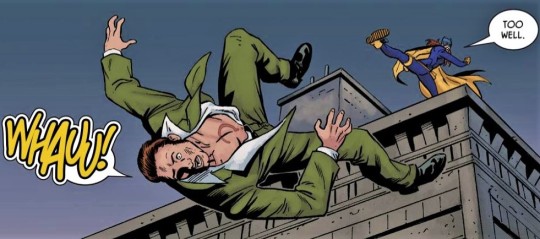
I know basically every Riddler fan unequivocally hates Prelude to the Wedding: Batgirl vs. Riddler, but I originally read it in a vacuum straight off of “War of Jokes and Riddles” after avoiding all modern Riddler content for years, and I thought it was both a) the most novel approach to Riddler having a “romantic interest” since Joker’s Asylum in 2010, and b) ridiculously loaded with (probably?) unintentional subtext. So here’s why I think it’s interesting, which for me is basically equivalent to being “good.”
The Wedding Thing
So, the inciting incident that leads Edward to seek out Barbara is the discovery that Batman is marrying Catwoman. The idea that Batman could not only fall in love with a criminal but decide to start a life with them makes him reconsider what he thought was possible, and wonder if he could potentially achieve something similar.
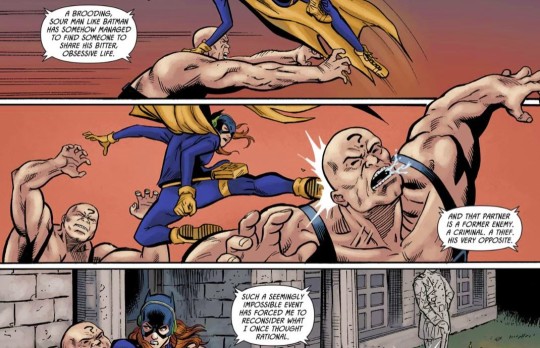
Arguably, that much would be a natural reaction to any supervillain finding out that Catwoman is marrying a superhero (“You can do that????”), but what’s decidedly less rational is Edward’s subsequent conclusion that if X = BatCat wedding, Y = Batgirl is his soulmate.
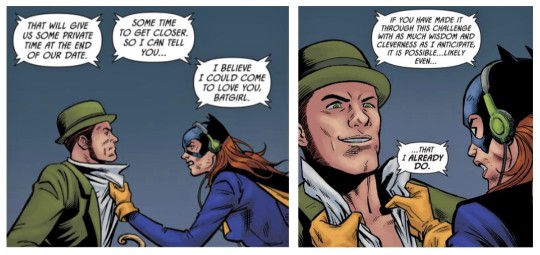
What makes this especially disturbing is that Edward and Barbara have clearly never interacted before; it’s stated multiple times in the comic. So Riddler basically just saw the bat symbol on the chest of an adult woman and assumed that they were kismet (I wonder if he just lucked out in not choosing Kate, or if he’d heard through the grapevine that she doesn’t swing that way).
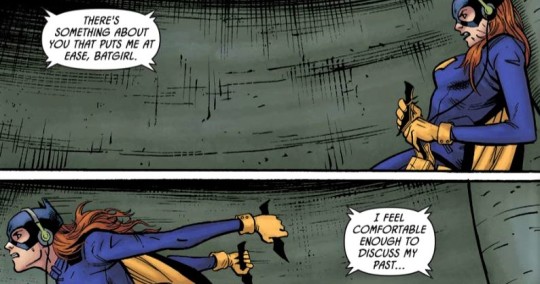
This is pretty fucked up. It’s also inherently self-defeating, which interestingly enough, seems intentional on Edward’s part. In their final confrontation, he notes that despite having led her on a wedding-themed riddle quest across Gotham (having her rescue a florist, a DJ, and a priest), he’s not delusional enough to think that they would ever actually get married. In his own words, he’s no Catwoman; this New 52/Rebirth version of Edward has killed too many people to believe that he could ever end up with a superhero.
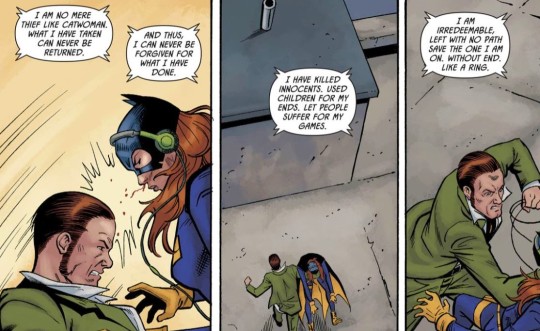
(This is offtopic, and forgive me for momentarily pretending that comics have internal continuity, but this bit did remind me of how in Batman Annual #4, Edward gets angry at Bruce Wayne for getting amnesia and thus being able to escape his brokenness enough to get married and have a “happy ending.”)
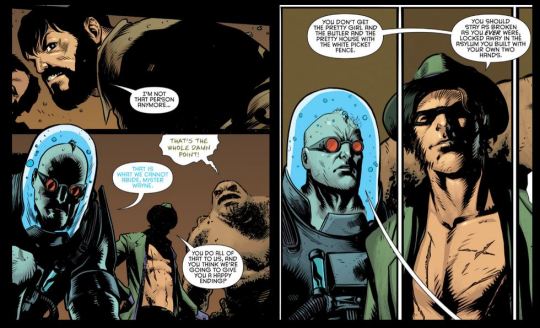
Batgirl vs. Riddler ends with Edward saying that Batman marrying Catwoman has forever changed his perspective, and his confrontation with Batgirl was him trying to grapple with a question that has been eluding him ever since— “what if?” Readers might point out that if he was wondering “what if” he wasn’t a serial killer and could have normal relationships, then putting a bunch of people in death traps for a superhero to save was a really stupid way to solve that mystery for himself. Which... yes. Yes it is.
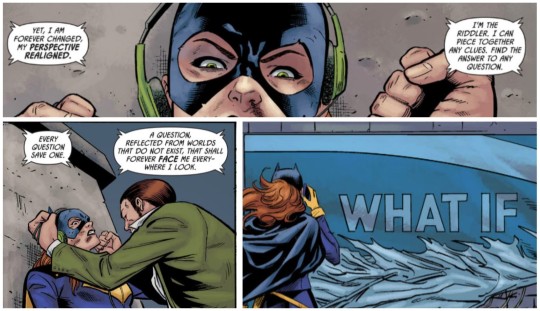
This comic is kind of the opposite of Joker’s Asylum, where Edward is trying to solve the riddle of how to “win” a woman... and then discards her as soon as he succeeds, because she was just a puzzle to be solved. Here, Edward seems to be trying to solve himself, and is using his “love interest” as a tool to do so. He might even be hoping that Batgirl will solve the puzzle for him, though obviously his ego would prevent him from actually saying that. The pageantry of leaving clues for wedding themed crimes is pretty clearly just an excuse to guarantee an audience for when he talks about himself. And he does A LOT of that.
The Monologuing
Nearly the entirety of this comic is just Batgirl listening to audio tapes that Edward left for her, in which he goes into uncomfortable detail about his personal life that Barbara clearly doesn’t want to hear. She learns his favorite music, that he considers himself a former “mild-mannered software engineer” (a career that doesn’t fit with any of the other canon information we have about his past, but... whatever), and that he is under the impression that he’s Batman’s archenemy (keep pushing that narrative, Eddie). She also learns about his “history with females” (his words).
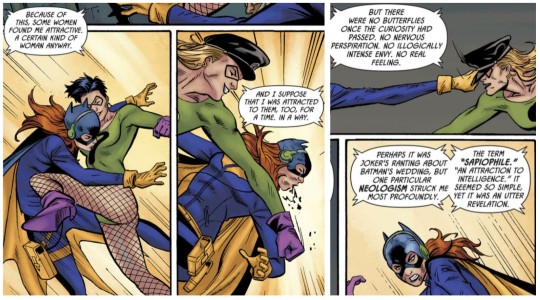
He describes how in his previous romantic experiences with women, he was attracted to them “for a time, in a way,” but that after his initial curiosity had passed there was “no real feeling” to the encounters. He tells Barbara that Joker’s anger and distress over Batman marrying Catwoman caused him to reconsider why his relationships with women were always so passionless... and hilariously concludes that he must be a “sapiophile,” and he’s just never been with any women who were smart enough for him.
My Inevitable Riddlebat Conclusion
So to summarize: Edward heard that Batman was marrying a supervillain, was shocked by the fact that this was a possibility and started obsessing over it for himself, re-evaluated all his previous relationships with women and realized that he had never been fully interested in them, and decided that his real soulmate was a person wearing a bat costume. It really reads like Edward was halfway to realizing he was in love with Batman, then reversed gears and decided to project his sexuality crisis onto a woman he’s never met instead.
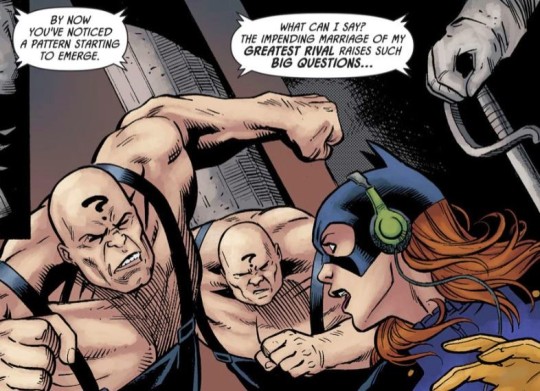
Through this lens, it’s pretty notable that Edward isn’t really doing anything to seduce Batgirl at all. He’s just doing the same riddle-crime routine he always does with Batman. Beat for beat, Batgirl vs. Riddler is actually incredibly similar in structure to “Alone,” one of my favorite Rebirth Riddler comics: the main difference is that the panels of Batman solving Edward’s riddle hunt is offset by Edward talking to his psychiatrist, not monologuing into a tape recorder. Again, not to imply that there is any internal continuity in comics, but that story also features Edward hoping someone else will “solve” him— Edward himself is confused and torn over why he continuously leads Batman directly to him in their games, and gets angry and disappointed when his psychiatrist misunderstands his motivations rather than figuring him out.
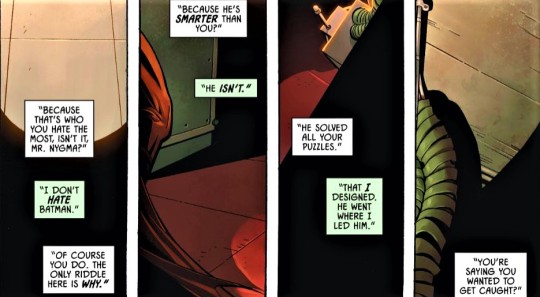
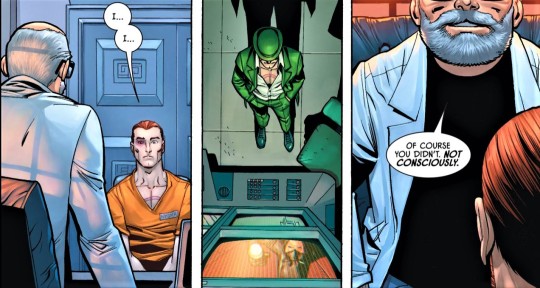
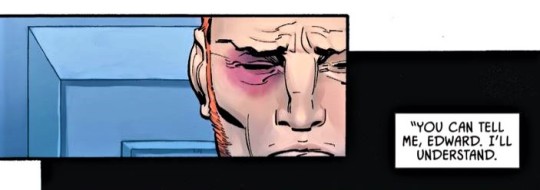
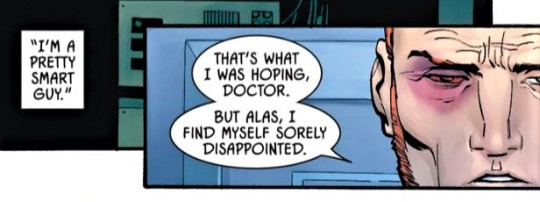
Unlike “Alone,” all Edward’s dialogue in Batgirl vs. Riddler is recorded ahead of his crime spree. When Edward on the tape recorder tells Batgirl that he anticipates that he might fall in love with her if she successfully solves all his riddles, it’s framing the entire escapade as an experiment for himself. Barbara’s feelings don’t even matter, since Edward is assuming from the get-go that she would never be interested in a mass murderer. He’s basically testing whether he would fall in love with a woman who checks off all the same boxes that Batman does, right down to solving his ridiculous riddle crimes while wearing bat ears.
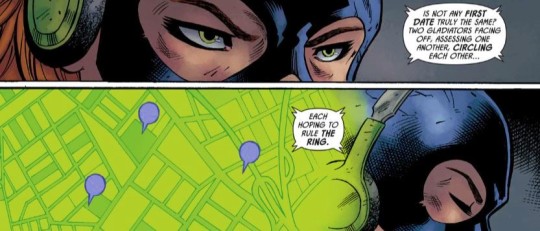
Regardless of Riddler’s feelings towards Batman, he obviously spends this story testing a hypothetical of what actual love would be like for him, even though he believes that it’s not something he can actually have. Barbara, despite having never met the man, is the unfortunate target of this self-exploration. Interestingly, she does come to some understanding: after kicking Edward off of a building, she decides to bite the bullet and call Nightwing, realizing that dwelling over the “what ifs” of their relationship was much more miserable than facing potential disappointment by being honest about what she wants.
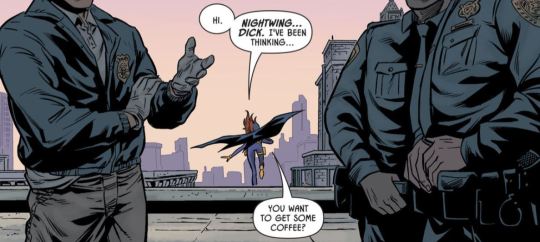
#riddlebat#edward nygma#riddler#barbara gordon#batgirl vs. the riddler#prelude to the wedding#meta#everyone hates this comic but it's a huge part of how i see rebirth riddler's character so i feel compelled to defend it#of course everyone also hates rebirth riddler#so maybe it's just a lost cause#god knows rebirth isn't the hill i'm going to die on#but i still think this comic is gay so here#seven google doc pages of analysis. fetch
168 notes
·
View notes
Text
Kristen wasn’t love, she was obsession.
Isabella wasn’t love, she was nostalgia.
Lee wasn’t love, she was desperation.
Edward Nygma doesn’t know what love is or how it should look, he has never been shown much of it and hasn’t had the greatest examples. Love is about sacrifice, but not about complete sacrifice, it isn’t about giving yourself up for someone else. Your needs and happiness shouldn’t come second to someone else’s, the relationship should be about about your partner being an equal to you and vice versa.
Kristen seen him as her white knight.
Isabella seen him as her possession.
Lee seen him as a tool to be used.
Ed lets himself be used for the sake of love, allows himself to be taken advantage of and manipulated in the hopes that it will make them love him more. He does his best, with his riddles and his methods of showing them how he loves, but it’s either not enough or too much for them.
Do you know who loves him unconditionally? Oswald Cobblepot.
Oswald is selfish and manipulative and explosive, he doesn’t let people stand in his way. He knows exactly what he wants and how to get it. At the same time though, he would give Ed the world if he asked him to. He threatened the warden of Arkham to let him out, gave him clothes and a home and a job. Oswald looked at him like he’d hung the moon in the sky, like that man could do no wrong. Our beloved King of Gotham accepted all of him, flaws and quirks and riddles, and still fell in love with him.
Looking at his past relationships (Kristen and Isabella), it’s understandable why Ed didn’t realise that Oswald was in love him him, he’s never been loved for just being himself. Oswald seen him as a close friend and ally, as someone he could trust in his home and with his possessions. He trusted him with his campaign and his secrets, and trusted him to help him run the Underworld of Gotham. Ozzie literally gave Ed all he could, and our equally as beloved Master of Riddles didn’t know how to cope with the adoration, he’s never been admired and loved so completely before.
Edward is an idiot if he thinks Oswald doesn’t love him anymore, regardless of what he says. Gertrud said that life only gives you one love, and her word was like gospel to Oswald. No matter what happens, he will always see Ed as his soulmate. Cue the song!
#gotham#Edward Nygma#The Riddler#Kristen Kringle#Isabella#Leslie Thompkins#Lee Thompkins#character analysis#he wants to know what love is#Oswald tries to show him#Oswald Cobblepot#The Penguin#Nygmobblepot#Riddlebird#thanks for coming to my ted talk
1K notes
·
View notes
Text
Can't stop thinking about Ed having a dead frog in a jar at his place of work. I care about this more than any of the stuff in his apartment.
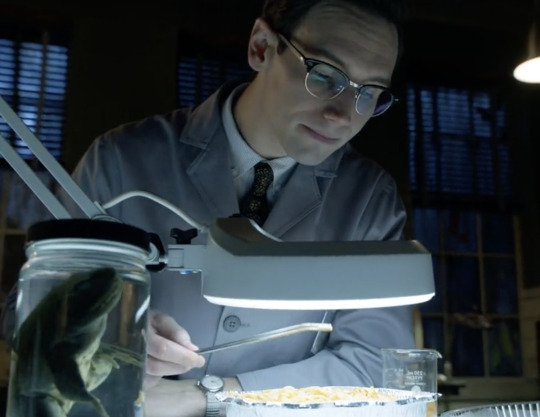
#cw dead animal#gotham#tv#dc#ed nygma#the riddler#edward nygma#gotham season 1#character appreciation#set design#gcpd#be gay do crimes#be gay solve crimes#gotham season 2#nygmobblepot#character analysis#media commentary#show commentary#episode commentary#fandom#autistic coded character
169 notes
·
View notes
Text
Other people weakened/humbled Oswald by reducing him to an animal (penguin, goose, monkey.) Ed did it by reducing him to a man.
#gotham#tv#media commentary#media analysis#show commentary#show analysis#character analysis#oswald cobblepot#the penguin#character appreciation#nygmobblepot#riddlebird#oswald x edward#ship dynamics#ships#gotham season 1#gotham season 3#ed nygma#the riddler#queer headcanons#canon queer characters#be gay do crimes#alphabet mafia#dc#otp#lgbt+#rogues gallery#relationship analysis
113 notes
·
View notes